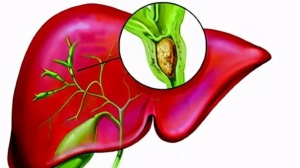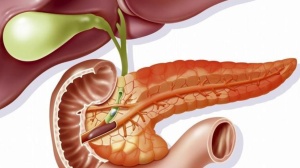中国是世界上胆管癌发病率最高的国家之一,据《2016年欧洲胆管癌研究共识》统计,中国胆管癌发病率为6/100000人,按此测算,中国每年新发胆管癌患者约8万人[1]。根据发病位置不同,胆管癌可分为肝内胆管癌和肝外胆管癌(肝门部胆管癌和远端胆管癌)。
近年来,胆管癌的发病率正在上升,手术是胆管癌可能根治的唯一治疗手段。研究数据显示,由于胆管癌的非特异性临床表现,大多数胆管癌患者(>65%)在确诊时已失去根治性手术机会[2]。系统性抗肿瘤治疗为晚期胆管癌患者主要治疗手段,传统的以铂类为基础的一线化疗中位总生存期<12月,5年生存率极低[3,4]。二线暂无标准治疗方案,临床常见的现有治疗方案中位总生存期仅为6个月左右[5,6]。目前国内针对晚期胆管癌患者的有效治疗手段有限,疗效不尽如人意且安全性欠佳,存在亟待需要满足的临床需求。
随着对胆管癌基因变异谱的认识和基因检测的普及,越来越多的肿瘤异质性基因变异被检出,这为胆管癌的分子靶向治疗奠定了基础。其中作为胆管癌第一个获批靶向药作用的位点,FGFR2融合/重排逐渐进入了学界的视野。FGFR属于受体酪氨酸激酶家族,有FGFR1/2/3/4四种受体亚型。研究显示这条通路,在细胞的生存、分化、增殖和凋亡过程中发挥重要作用[7]。当编码FGFR跨膜蛋白的基因与编码其他蛋白的基因发生激酶域融合,导致受体不依赖配体发生二聚化或组成性激活,下游信号通路过度激活,从而驱动肿瘤发生[7,8]。
佩米替尼片(Pemigatinib片)是一种选择性FGFR1-3抑制剂,可以阻断FGFR1、FGFR2、FGFR3的自身磷酸化及下游信号传导,抑制FGF-FGFR信号通路,抑制肿瘤生长[9]。
参考文献:
[1] 2016年欧洲胆管癌研究共识
[2] Banales J M , Cardinale V , Carpino G , et al. Expert consensus document: Cholangiocarcinoma: current knowledge and future perspectives consensus statement from the European Network for the Study of Cholangiocarcinoma (ENS-CCA)[J]. Nature Reviews Gastroenterology & Hepatology,2016,13(5):261-80.
[3] Valle J , Wasan H , Palmer D H , et al. Cisplatin plus Gemcitabine versus Gemcitabine for Biliary Tract Cancer[J]. New England Journal of Medicine, 2010, 362(14):1273-1281.
[4] CSCO 胆道恶性肿瘤诊疗指南. 2020.V.1.0
[5] NCCN临床实践指南:肝胆肿瘤.2020.V1
[6] AngelaLamarca , et al. A randomised phase III, multi-centre, open-label study of active symptom control (ASC) alone or ASC with oxaliplatin / 5-FU chemotherapy (ASC+mFOLFOX) for patients (pts) with locally advanced / metastatic biliary tract cancers (ABC) previously-treated with cisplatin/gemcitabine (CisGem) chemotherapy[J]. Journal of Clinical Oncology, 2019, 37(suppl).
[7] Irina S Babina, Nicholas C. TurnerAdvances and challenges in targeting FGFR signalling in cancer[J]. Nat Rev Cancer. 2017,17(5):318-332.
[8] Nicholas Turner, Richard Grose. Fibroblast growth factor signalling: from development to cancer[J]. Nat Rev Cancer. 2010,10(2):116-29.
[9] Liu PCC, et al. INCB054828 (pemigatinib), a potent and selective inhibitor of fibroblast growth factor receptors 1, 2, and 3, displays activity against genetically defined tumor models[J]. PLoS One. 2020,15(4):e0231877.
[10] Ghassan K Abou-Alfa, Vaibhav Sahai, et al. Pemigatinib for previously treated, locally advanced or metastatic cholangiocarcinoma: a multicentre, open-label, phase 2 study[J]. The Lancet Oncology. 2020,21(5):671-684.
[11] G.-M. Shi, J. Zhou, et al. Efficacy and safety of Pemigatinib in Chinese patients with unresectable, advanced, recurrent, or metastatic intrahepatic cholangiocarcinoma with FGFR2 fusion or rearrangement that failed prior systemic therapy. ESMO 2021. Poster 50.
[12] Valle JW, et al. New Horizons for Precision Medicine in Biliary Tract Cancers [J]. Cancer Discovery. 2017;7(9):1-20。
本文仅供医学药学专业人士阅读




















 X
X